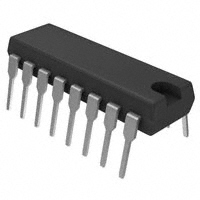1. 物料型号:
- 商用型号:74F193PC(N16E封装)、74F193SC(M16A封装)、74F193SJ(M16D封装)、74F193FM(W16A封装)
- 军用型号:54F193DM(J16A封装)、54F193FM(W16A封装)、54F193LM(E20A封装)
2. 器件简介:
- 'F193是一款可逆的4位二进制同步计数器,具有独立的计数上升和计数下降时钟输入,支持同步操作。该器件包含四个边沿触发的触发器,内部具有控制逻辑,以实现主复位、独立预置、计数上升和计数下降操作。
3. 引脚分配:
- U.L. HIGH/LOW:输入高/低电平输出
- CPU:计数上升时钟输入(上升沿有效)
- CPD:计数下降时钟输入(上升沿有效)
- MR:异步主复位输入(高电平有效)
- P:异步并行加载输入(低电平有效)
- P0-P3:并行数据输入
- Q0-Q3:触发器输出
- TCD:终端计数下降(借位)输出(低电平有效)
- TCU:终端计数上升(进位)输出(低电平有效)
4. 参数特性:
- 保证最小4000V的ESD保护。
5. 功能详解:
- 'F193是一个4位二进制可逆计数器,包含四个边沿触发的触发器,通过内部控制逻辑实现主复位、独立预置、计数上升和计数下降操作。计数上升时钟(CPU)和计数下降时钟(CPD)输入的低至高转换将使计数增加或减少。终端计数上升(TCU)和终端计数下降(TCD)输出通常为高电平,在达到最大计数值15时,TCU将变为低电平。
6. 应用信息:
- 该器件可用于需要计数功能的数字电路设计中,如多级计数器设计、分频器等。
7. 封装信息:
- 提供了多种封装选项,包括塑封双列直插(DIP)、塑封小外型(SOIC)、陶瓷双列直插(Ceramic DIP)和无引脚陶瓷芯片载体(LCC)。
